If you’re dealing with technical products, it’s common for your sales team to find it difficult to close deals. After all, these products often come with complex features and specifications that can be challenging for customers to understand- so selling them can be a challenge! But there are a few things you can do to help them succeed and in this article. We’ll explore strategies to help your sales team succeed in the tech sales game.
Selling Technical Products?
Before jumping into techniques for selling complex tech items. Let’s first take a look at what your sales team actually needs to know about these types of products. In general terms, any item being considered as ‘technical’ will typically require more knowledge than those from other sectors (e.g., fashion or home goods).
When selling tech items such as computers or smartphones, details like RAM sizes and CPU processors play an important role during the decision-making process. Thus having adequate expertise on these topics is essential if one hopes to guarantee customer satisfaction down the line.
This includes both current industry trends as well as product specifications. Diving into properties within new technologies should also become a routine activity to ensure seamless customer conversations post-purchase too!
Reasons Why Your Team Might Be Struggling
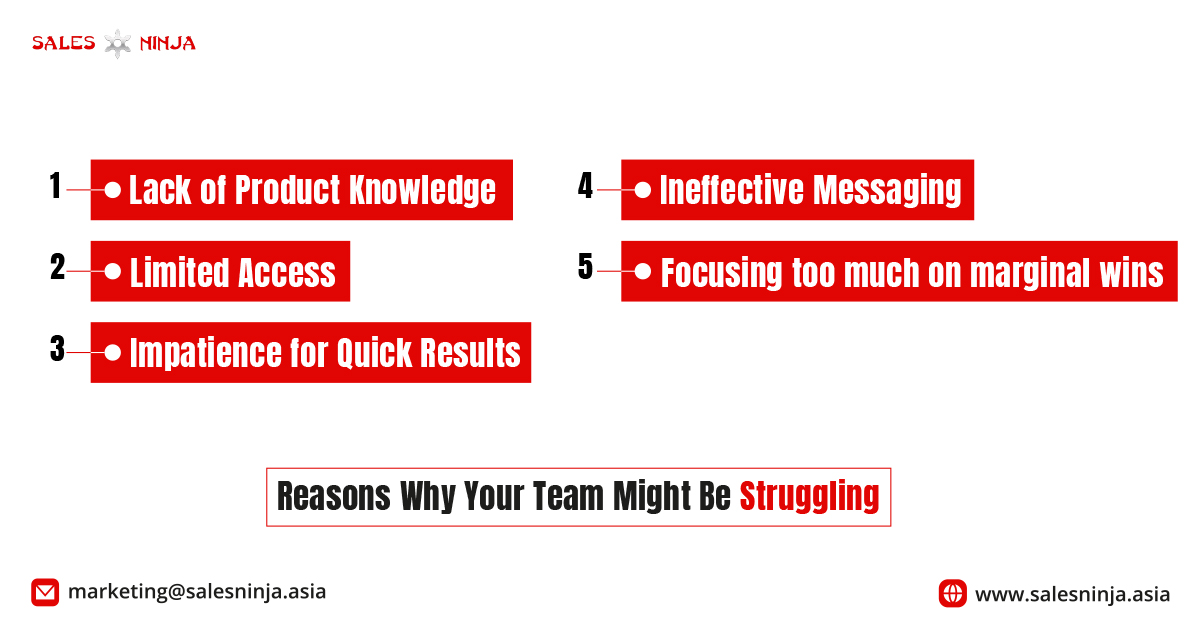
When it comes to selling technical products, there can often be a high barrier to entry. Even the most talented sales teams may struggle when faced with complex products that require in-depth explanations in order for customers to understand them. Here are five reasons why your team might be struggling:
1. Lack of Product Knowledge
As we have mentioned earlier, if your sales reps aren’t familiar with the products or services they’re trying to sell. Then they’ll likely find themselves facing an uphill battle every time they make a pitch.

2. Ineffective Messaging
Many times, reps simply need guidance on how best to present their products for greater success rates.

3. Limited Access
Sales representatives may not have sufficient opportunities or time for meaningful interactions and discussions with potential customers. Especially in cases where complex transactions are involved.

This lack of access can hinder their ability to build relationships and establish trust with customers, potentially impacting the success of the sales process.
4. Focusing too much on marginal wins
Sometimes, sales teams focus too much on small orders that are easier to get. These smaller deals require less effort upfront. But to reach your growth goals, you need a lot of these small deals. That means you’ll end up with less money in the long run, and it’s harder to make a good profit.

5. Impatience for Quick Results
Closing big deals takes time and effort. It’s like building something from scratch instead of using something that’s already available. Pushing your team to hurry through the process won’t give you good results. It’s like trying to rush a project by skipping important steps, which will only cause problems and delays. It’s better to let things move at their own pace for a successful outcome.

How You Can Help Your Team To Be Better At Tech Selling
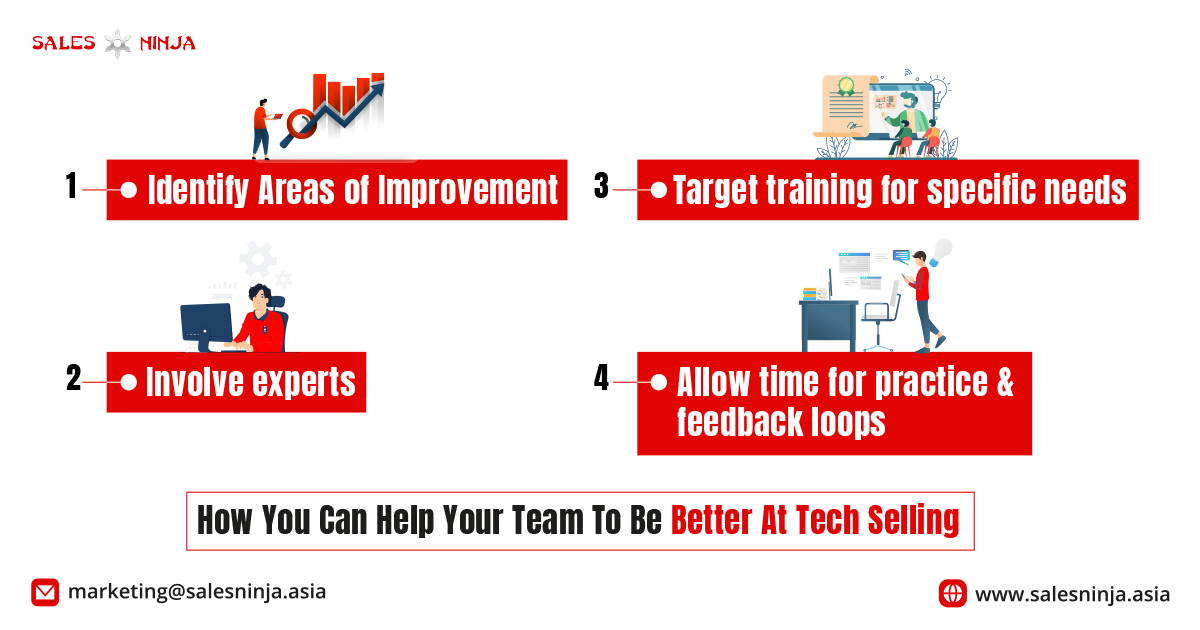
In the tech industry, enhancing your sales team’s ability to sell technical products effectively is crucial for success. To achieve this, focus on the following key points:
-
Identify Areas of Improvement
Take time to assess each individual on the sales team and discuss areas for improvement with them. Talk about their personal selling skills, knowledge of technology concepts. And also any other relevant issues that could help make them more successful at selling technology solutions.
-
Involve experts
If possible, allow members of the sales team to work with someone who really understands and knows more than them on particular topics or technologies. This helps teams understand nuances that appear only through firsthand experience using a product/service every day. Rather than just reading documentation or talking points from vendors/partners – get those real-world insights!
-
Target training for specific needs
Explore different types of tailored training options built around education covering niche areas versus broad-based generic themes (coming soon). Such as lead generation tactics that focus specifically on Artificial Intelligence/Machine Learning products. Instead of plain B2B Sale strategies universally applicable across any industry sector or geographical region overly scoped out.
-
Allow time for practice and feedback loops
Assign regular “storytelling” meetings where each member must present ideas. And challenges faced while dealing with clients involving tech output sold along. With analyzing outcomes within their colleagues. Having collective input allows all participants to gain insight upon current task approach while iterating techniques used towards resolution moving forward whenever needed!
Best Practices For Technical Products Sales
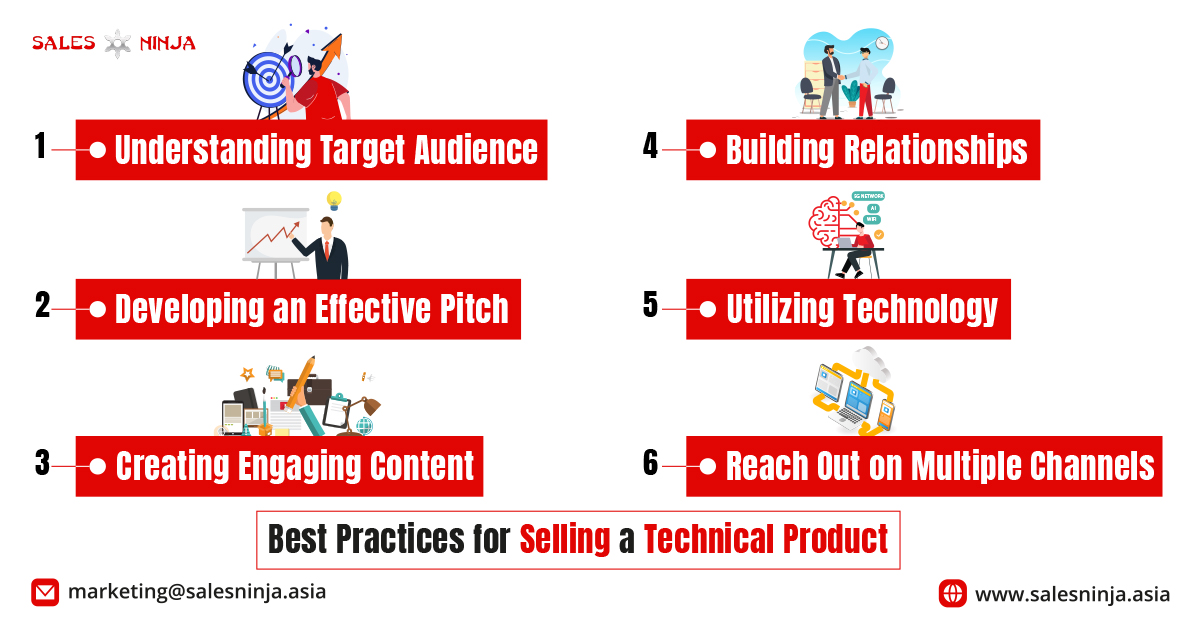
Selling a technical product can be challenging due to its complexity. In order to maximize the success of your sales, it is important to understand best practices for selling this type of product.
-
Understanding Target Audience
The first step towards successful sales of any technical product is understanding who your target audience may be. You must research extensively into groups likely interested in or educated enough about your product. So that you can craft effective marketing campaigns tailored specifically towards them. Understanding their needs, interests, and problems are all essential information points that should guide both the development and eventual sale of your technical item.
-
Developing an Effective Pitch
Once you understand the product, you need to develop an effective pitch that explains why someone should buy it over other similar options available on the market. They should focus on highlighting unique features as well as any benefits associated with using their particular product rather than just listing off specs or facts about it.
Keep in mind that many clients have already explored various solutions before reaching out, so your pitch should stand out from the generic marketing language. Provide data-driven insights, such as ROI calculations, to demonstrate the financial advantages of choosing your product. This approach helps potential customers see how your product can genuinely improve their lives and why it’s worth investing in. -
Creating Engaging Content
Apart from crafting an effective pitch, it’s crucial to create engaging content about your technical products to capture the interest of potential buyers. And also motivate them to make a purchase on your website or in your stores. This can involve creating blog posts that explain different aspects of your products or producing videos that showcase how various components function within larger systems.
The goal is to simplify complex concepts, making them more accessible to non-experts, especially the average consumer, before they decide to invest in expensive high-tech gadgets or systems from your company. -
Building Relationships
Sales success often comes down to establishing a good rapport with people. Technical buyers aren’t any different! Focus on building trust while still being professional- introduce yourself properly & explain where/how exactly YOUR PRODUCTS differ from existing ones already out there – then provide detailed answers as required explaining the science behind its value proposition etc.
Last but not least don’t forget social niceties – offering helpful advice beyond scope inquiry goes a long way in fostering a lasting positive relationship between the supplier(You!) & the buyer(Client!). -
Utilizing Technology To Increase Customer Engagement
Enhance customer engagement by using digital technologies like chatbots and video conferencing. These technologies enable customized interactions tailored to user preferences, making transactions more efficient. Additionally, e-commerce websites that employ AI tools for personalization can influence purchase decisions and streamline manual tasks, ultimately benefiting overall business scalability.
-
Reach Out on Multiple Channels
When selling a technical product, it’s essential to reach out to potential customers through multiple communication channels. Instead of relying solely on one method, such as email or phone calls, diversify your approach. Use various channels like social media, email marketing, webinars, online chat support, and even in-person meetings. It will increase the chances of connecting with prospective buyers effectively. In addition, it will engage you with the customers on the platforms they prefer.
Common Challenges In Technical Products Sales And Their Solutions
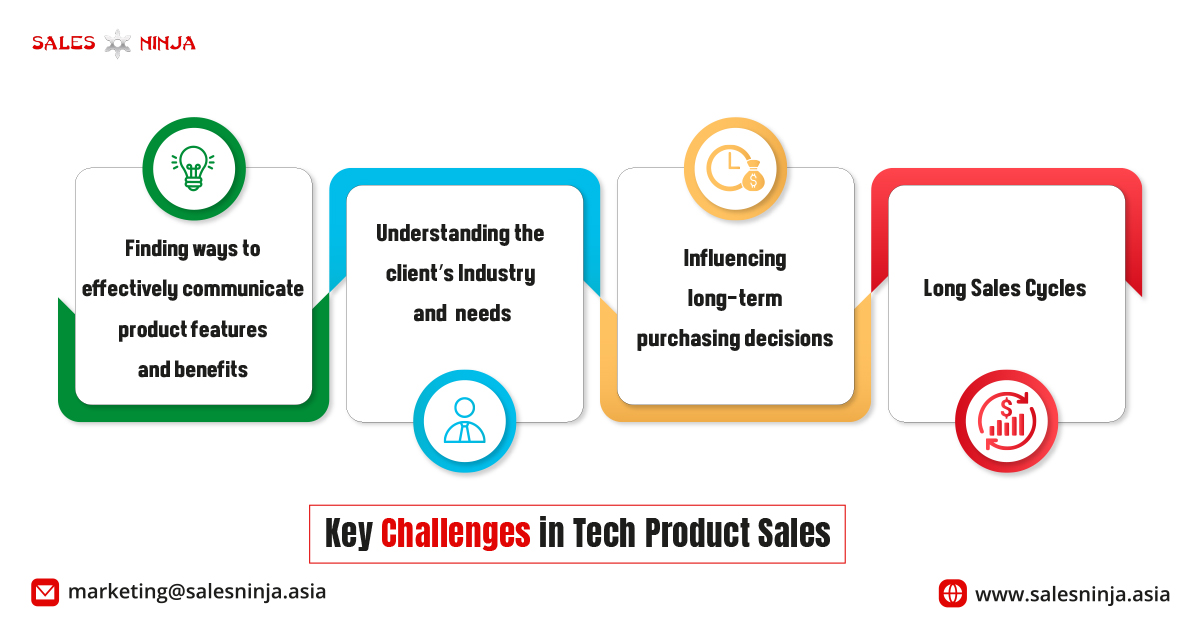
Here, we’ll explore some of the common challenges faced by tech product sales professionals and provide practical solutions to overcome them. Whether you’re dealing with complex product features, long sales cycles, or the need to communicate effectively. We’ve got you covered with actionable advice to boost your tech sales game. Let’s start.
-
Finding ways to effectively communicate product features and benefits
Sales of tech products present many challenges to businesses, particularly when it comes to effectively communicating the features and benefits of a product. Many potential customers find it difficult to understand how a technology solution might help them or solve any problem they may have.
However, it can be difficult for companies who don’t specialize in consumer electronics or technology fields to understand regulations or customer needs that come along with selling products in these markets. Additionally, sales teams often struggle to determine strategies on how best to reach potential customers and gain their confidence so they purchase their offerings. Finding ways around those obstacles is essential for any company hoping to increase revenues from tech product sales.
Solution: It’s important for companies selling technical solutions to find effective ways to explain their products in terms that are easy to understand, so consumers can evaluate whether those products would be useful for them or not. This could include providing informative demos, interactive webinars, tutorial videos about different use cases, or detailed user manuals with step-by-step instructions. In this case, encourage them to use simple language, employ visual aids, and adopt a customer-centric approach to presentations. -
Understanding the Client’s Industry and needs
One of the biggest challenges with selling tech products is understanding the complexities and needs of each client’s industry. While the sales team’s primary goal and key performance indicator (KPI) is to make sales, they may overlook the critical importance of understanding their client’s industry. But as a sales professional, they need to have a good knowledge of how technology can be applied to any given situation or use case that occurs in your customer’s sector.
Furthermore, a lack of knowledge about the client’s industry can hinder the development of a value proposition that truly addresses the client’s pain points. It’s not only about customization but also about offering solutions that align with the industry’s dynamics and challenges, which is essential for successful tech product sales.
Solution: To address this challenge, investing in ongoing education and training for sales professionals is essential. This education should cover industry-specific knowledge, emerging trends, and potential use cases of the technology in different sectors.
Additionally, maintaining open channels of communication between the sales team and technical experts within the organization can bridge any knowledge gaps and ensure that the proposed solutions align with industry dynamics.
Moreover, collecting and analyzing customer feedback can provide valuable insights into industry-specific needs and challenges. -
Influencing long-term purchasing decisions
While short-term gains might be made through aggressive marketing tactics or discounts on the product itself, this may not necessarily convert to consistent and sustained customer loyalty in the long run. Because many tech products are complex and require significant investment, both in terms of time and money.
Consequently, convincing customers to commit to a long-term relationship requires them to understand how it works, how it benefits their business, and how it aligns with their long-term goals. Besides, the tech industry is constantly evolving. So customers may be hesitant to commit to a long-term purchase when they’re unsure if a newer, better solution will become available shortly.
Moreover, customers often have various options to choose from, making it even more challenging to persuade them to choose your product for the long haul.
Solution: It’s therefore important for businesses in this sector to ensure they capture customer attention early by providing innovative offers, engaging content experiences, and timely communication channels so they can influence long-term purchases.
Nowadays, technology and digital marketing play a vital role in influencing long-term purchasing decisions. According to Sales Challenge of Tech Products, laying out the groundwork for increasing first-time buyers into loyal customers requires careful planning.
This includes focusing on developing personalized customer experiences that can influence repeat purchases by integrating data from multiple channels across product lifecycles service offerings, special promotions and loyalty programs is paramount.

-
Long Sales Cycles
Long sales cycles in the tech industry are primarily characterized by their extended duration. Often caused by the significant financial commitment required from the client’s side. Additionally, tech sales typically involve B2B decisions, which frequently include multiple layers of decision-makers. This extended timeframe not only affects cash flow but can also demotivate the sales team.
Solution: To make long tech sales cycles shorter, you need to do a few things. First, build good relationships with your clients by giving them what they want. This will help them make decisions faster. Second, make it easy for clients to pay by offering different payment options.
Third, understand how decisions are made in big companies and talk to the people involved. Finally, keep your sales team motivated with training and rewards. In short, making long tech sales cycles shorter means focusing on customers, being flexible, talking to the right people, and keeping your team excited.
Selling technical products doesn’t have to be an uphill battle. By equipping your sales team with product knowledge, effective communication skills. And the ability to adapt to long sales cycles, you can increase your chances of success in the tech industry. Remember, understanding your target audience, offering valuable solutions. And engaging customers through multiple channels are key ingredients for tech sales success.
If you’re seeking innovative strategies to optimize your technical sales team’s performance, don’t hesitate to reach out to us. We’re here to assist you in achieving your goals. Visit Sales Ninja to learn more.


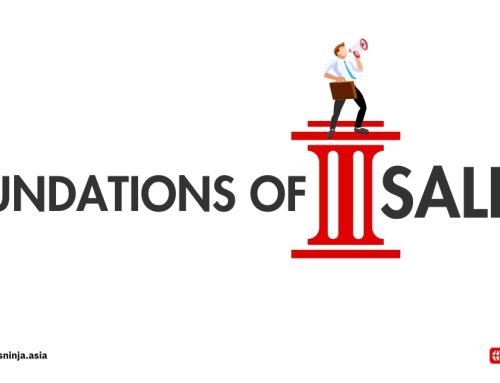


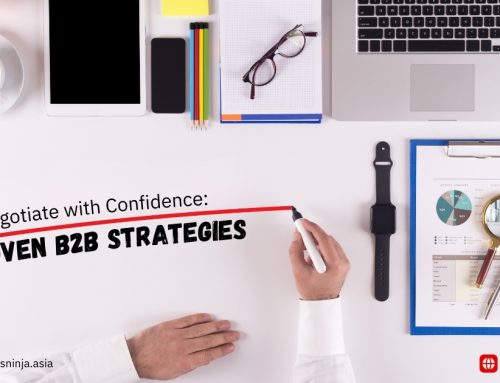
Leave A Comment